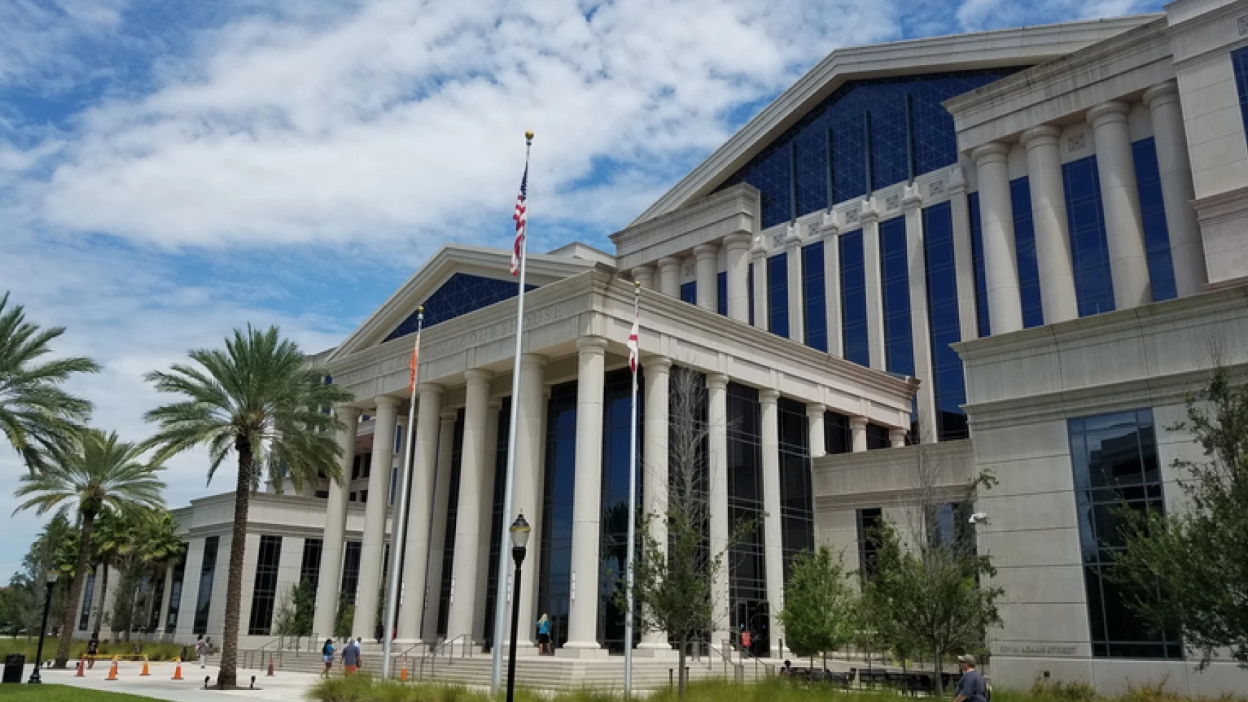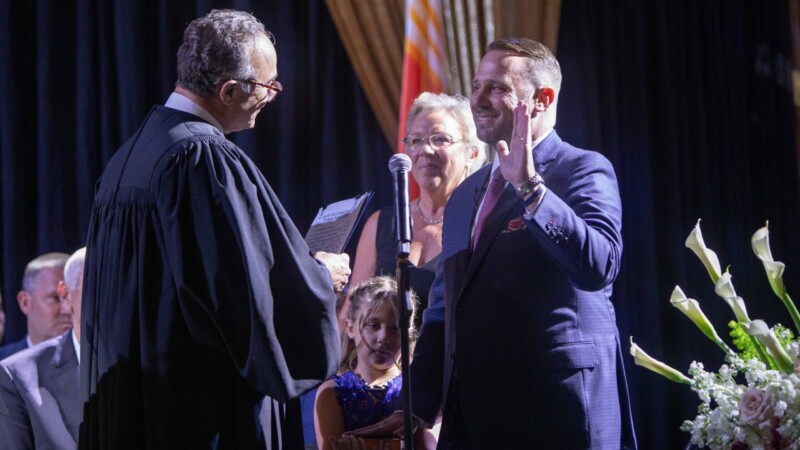Florida could ban a youth advocate and former Jacksonville teacher from its education system for displaying at school a Black Lives Matter flag and anti-Confederacy face masks three years ago.
Court hearings on Wednesday and Thursday last week featured testimonies and debate on the Florida Department of Education’s allegations against Amy Donofrio. This administrative law case tests the extent of Florida’s rules limiting what teachers are allowed to say and do in the classroom.
Donofrio taught for nearly a decade at Riverside High School — formerly Robert E. Lee High School — until 2021, when the Duval County Public Schools district reassigned her to a warehouse. She won $300,000 from the district a few months later in a lawsuit settlement. She didn’t win her job back.
The case against Donofrio unfolded against a backdrop of legal challenges and the state’s heightened scrutiny of teachers. On one side, civil rights activists say the state’s actions threaten the fabric of academic freedom and free speech. On the other, the state argues it is ridding its educational system of political activism that doesn’t belong in a classroom.
The state has expanded its control of what teachers can do in school with several laws in recent years. The Stop Woke Act in 2022 barred teaching that makes students feel guilty for historic racism and sexism. Parental Rights in Education — sometimes derided as the Don’t Say Gay law — banned teaching about sexual orientation or gender identity for grades eight and below, and it prohibited teaching that wasn’t “age-appropriate” for high schoolers.
Early on the morning of the first hearing, activist groups, including the Duval Progressive Caucus and Take ‘Em Down Jax, protested the state’s decision to go after Donofrio.

“All Amy did, in my opinion,” said organizer Wells Todd, “was what the students wanted. What the students thought needed to be done.”
About 30 attendees watched the hearing on its first day. Those interviewed by The Tributary said they feared Florida’s education arm may be expanding its enforcement tools to police teachers’ political speech, both in and out of school.
“It is a troubling time that a teacher would have to think that pursuing a classroom that’s safe and welcoming for their students could cause the state to want to come after your license,” Mark Richard, one of Donofrio’s lawyers, told The Tributary. “This is a unique case, and it is a case that should concern every parent in the state that there’s something wrong with a school system that would not support and underscore teachers’ efforts to create that kind of classroom environment.”
Donofrio’s defense was led by Richard and Holly Oliva-Van Horsten, both from Miami-based law firm Phillips, Richard & Rind.
The state Education Department tapped Ron Weaver, an Ocala-based attorney, to prosecute the case against Donofrio. Weaver has run numerous administrative cases against teachers statewide. Weaver declined to answer questions, and the Education Department declined a request for comment.
The state’s case centers on Donofrio’s refusal to remove a Black Lives Matter flag draped outside her door and a pile of masks with the phrase “Robert E. Lee was a gang member” printed on them inside the class during the 2020-21 school year, as alleged in the department’s administrative complaint.
The state argues the flag and masks violate the state’s Principles of Professional Conduct for the Education Profession, a set of rules established by the governor-appointed State Board of Education.
The Department of Education argued Donofrio’s classroom displays — which school administrators told her to take down — violated two rules.
One rule requires teachers to “make reasonable effort to protect the student from conditions harmful to learning and/or to the student’s mental and/or physical health and/or safety.”
Another requires teachers to “take reasonable precautions to distinguish between personal views and those of any educational institution or organization with which the individual is affiliated.” The state has used that rule to go after at least one other teacher who had a presentation slide that included the words “Black Lives Matter,” but an independent panel ruled against the state, and that teacher won her job back.
Florida administrative law judge Suzanne Van Wyk will make a recommendation in the case sometime in the next two months. Van Wyk’s recommendation, along with the state’s and Donofrio’s responses, will go to the state’s five-person Education Practices Commission.
The independent panel will issue the final order that decides whether Donofrio will face sanctions and, if so, what kind. Those sanctions could include taking away her teaching license.
The debate in court took an epistemological turn, debating the meaning and interpretations of the words “Black Lives Matter.”
On one side, the state said the words represent a specific tax-exempt organization that funds activism. On the other, Donofrio’s lawyer argued the words represented a general statement of empathy for Black people.
The state’s lawyer, Weaver, even tried to get Van Wyk to accept a Wikipedia article, along with printouts from Dictionary.com, DBpedia and the homepage of the Black Lives Matter Foundation, one of many tax-exempt organizations named after the phrase, to rule ahead of the hearing that the words clearly referred to the organization.
Van Wyk denied that request in an order Feb. 5, explaining that the privilege Florida sought is reserved for “facts that are not subject to dispute” in concrete ways.
“The meaning of ‘Black Lives Matter’ is subject to dispute, perhaps even a material dispute in this case,” Van Wyk wrote in the denial. “Further, with the exception of Merriam Webster’s dictionary, the accuracy of the sources cited by (Florida) is subject to question.”
One question raised by Donofrio’s defense at multiple points was whether some widely embraced curricula, like studying George Orwell’s critique of totalitarian government in “1984,” fit the same criteria as content that the state is now seeking to prosecute Donofrio for.
Donofrio hasn’t worked in education since the Duval County district terminated her. Her “Florida educator’s certificate” — the license that’s necessary to teach at any public school and most private schools in the state — has been expired since July 2022.
Yet the state Education Department, if its disciplinary panel rules against her, could bar Donofrio from reapplying for a certificate either temporarily or permanently, or it could restrict what she’s allowed to teach in the future.
The agency also could make her pay a fine or order her to probation.
This story is published through a partnership between Jacksonville Today and The Tributary.







